Choosing whether to buy or rent a home can be a difficult decision for a lot of people. Both approaches have benefits and drawbacks.
That said, it's important to consider different factors before moving into a new home, whether it's rented or not. After all, both are big financial decisions.
To assist you in choosing the best course of action, we will weigh the benefits and drawbacks of purchasing vs renting a property in Indiana in this guide.
When you purchase a home, you become the owner. This implies that you are in total control of the property and can make any changes without a landlord's consent. Remember that you will need to abide by the HOA and municipal ordinances though. If not, you can paint the walls any color you like, replace the flooring, hang pictures, and do other things that you normally couldn't do in a rental. Furthermore, you will accumulate equity in the house over time, raising your net worth. If you've owned the house long enough and have equity in it, you will be able to sell it for a profit. Let's continue our discussion regarding these benefits.
Return On Investment
The ability to earn a sizable return on your investment is one of the biggest benefits of owning a property as opposed to renting, provided you make an informed decision. Most homes increase in value over time if they are well-maintained. This is particularly valid if you purchase in a sought-after area. Because of appreciation, you may be able to sell your house for more money than you paid when you originally bought it, which would increase your bank account balance.
Stability
It is impossible to predict whether a landlord will modify the terms of the rental agreement, raise the rate, or renew the lease. On the other hand, you can live in your house for as long as you choose and you know exactly how much your monthly payment will be when you own it.
Initial Cost
The initial outlay is among the biggest drawbacks of being a property owner. The majority of lenders demand a down payment of 5% to 20%. However, bear in mind that many lending programs call for either no down payment or a much smaller down payment. Closing costs range from 2 to 5 percent of the purchase price on average. Closing costs are normally the buyer's duty, although many buyers bargain with the sellers to have some of the fees covered.
Repairs And Maintenance
The continuous expenses associated with home ownership include upkeep and repairs. For the property to appreciate, upkeep is required. A house, however, is a long-term investment that, should you want to sell, can yield a profit.
Property Taxes
Lastly, property taxes are going to be your responsibility. The price is determined by your home's size, lot size, and location. As previously said, the return on your home can easily offset the expenses.
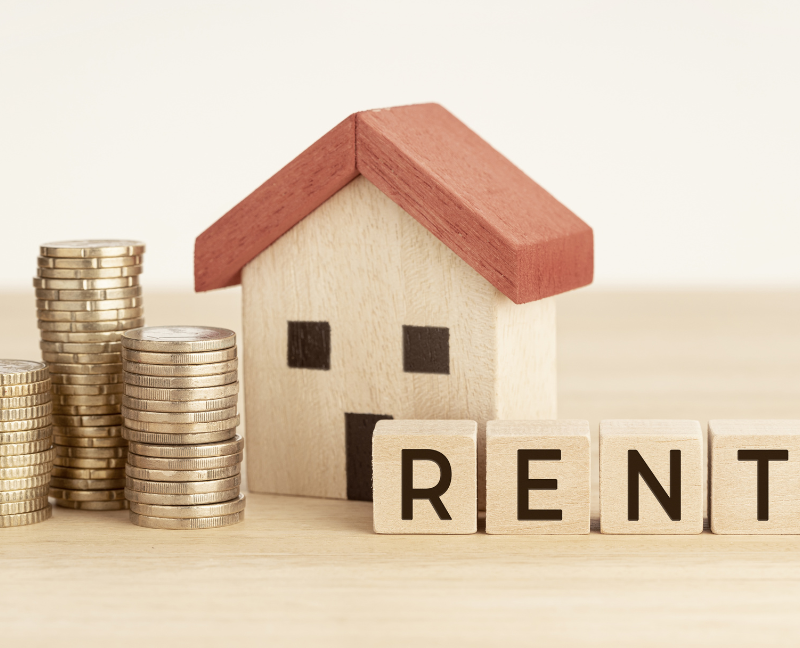
For those who lack the funds or are not ready to commit to home ownership, renting a property can be a great choice because it provides a lot of flexibility. Renting allows you to move about as much as you like, which is advantageous if you're not sure where you want to live in the long run. Let's find out the benefits and drawbacks of renting a house in more detail.
Affordable in the Short Term
Due to the absence of closing costs and a down payment, renting may appear more reasonable in the short term. Furthermore, you have no responsibility for upkeep or repairs related to the property. However, bear in mind that your rent payments will not be reimbursed to you in equity.
Little To No Maintenance
You are not in charge of any upkeep when you rent. On the other hand, you are not given the option to choose when or how the problem is resolved. This may cause you much frustration. Owning a property gives you the freedom to decide when and how to fix upkeep and repairs.
Must Follow Rules
You have to follow the rules set down by your landlord. You have to abide by the rules, no matter how strict the landlord is. You now have less influence over your life and living circumstances as a result. Many believe that their home is the only location where they can do anything they want. With a rental, this isn't the case. For instance, a lot of landlords forbid tenants from nailing décor to the walls. Remember that landlords are also accountable.
No Equity
In reality, you might as well be paying twice as much for someone else's mortgage. When you move out, there's no chance to produce a profit or receive a return on your investment.
Whether to buy or rent a house ultimately depends on your own circumstances. Buying could be the best option for you if you have the money to do so and are prepared to make a long-term commitment to one location. When the time comes to sell, you will receive a return on your investment from this long-term investment that has appreciated over time.
Need help deciding which one is right for you? Our team at RE/MAX Advanced Realty is here to help! Talk to us today so we can assist you with your concerns.
Imagine spending a hot day reading a book or sipping a beverage while relaxing by your own swimming pool. Meanwhile, the children, laughing and playing on their pool floats or practicing their dive.
Having a pool at home has long been considered a perk that only elites usually have. However, while others see it as essential, others think it's a deal-breaker.
To find out if installing an in-ground pool is worth it or not, especially if it's the best way to boost home value, make sure to read the entire post.
In the meantime, if you want to know how to boost the value of your home, here are some other free resources:
In-ground pool owners may anticipate a 56% return on their investment, according to the National Association of REALTORS® Remodeling Impact Report: Outdoor Features for 2023.
When it's time to sell, your home's worth may rise by a maximum of 7%, according to HouseLogic. However, that all relies on several different things, such as:

The report stated that landscape experts calculated the price of constructing an in-ground pool to be $90,000. A conventional filtration system, three to seven feet of depth, and walls made of gunite (a mixture of sand, water, and cement) are included in the price mentioned. The pool measures eighteen by thirty-six feet.
The cost of installing an inground pool can range from $80 to $250 per square foot, or a total of $25,000 to $100,000, depending on its size and material. Not to mention, tailored renovations or additions will incur additional costs, such as lighting, a diving board or slide, a heater, and landscaping.
Additionally, to keep kids and pets safe around water and to prevent accidents, the majority of jurisdictions mandate the installation of safety elements including covers, enclosures, and fences. For example, the cost of pool fencing alone might range from $5,000 to $15,000.
Sanitation is necessary to keep bacteria and germs under control in your swimming pool, regardless of its style or composition. In order to maintain the right pH, alkalinity, and calcium levels, the water must also be balanced. These are just a few of the annual and monthly expenses that come with owning a swimming pool and can affect its value.
A pool structure is usually covered by a normal home insurance policy without the need for a separate rider. However, if you intend to build a pool on your land, think about speaking with your insurance provider about how having a pool can impact your premiums and raise your liability coverage. Furthermore, if you fail to install a pool fence, your insurance may refuse to cover your pool and your liability claim in the event of an accident occurring in your pool.
While installing a pool may raise your yearly property taxes in some places, it may not affect how much your house sells for.
The only person who can accurately assess the return on investment of a luxury purchase like a swimming pool is you, the homeowner. Whether it improves your quality of life by providing a space for leisure, relaxation, and memorable occasions is up to you to determine.
According to the NAR Remodeling Impact Report, homeowners who added a pool reported a "joy score" of 10 on a scale of 1 to 10, suggesting that the addition significantly affected their sense of satisfaction and achievement following the project's completion. Additionally, after adding an in-ground pool, at least 90% of respondents said they enjoy their time at home more. That can be difficult to quantify.
You live here at the end of the day. Go ahead, jump in, and enjoy the swim if you intend to establish roots, have the funds, and have thought through the advantages and disadvantages of building a pool.
Many people have false beliefs about leading an eco-friendly lifestyle, especially the notion that it's costly, difficult, and calls for a full head of dreadlocks.
Being green really isn't that hard; all it takes is one small adjustment at a time to benefit the environment.
And here's the huge bonus: You may frequently save money by implementing these tiny lifestyle adjustments.
Here are the eco-friendly tips for home that can help save money:
For most homes, energy costs represent a considerable monthly expense, and domestic energy use significantly contributes to environmental problems. Improving energy efficiency can substantially lessen your influence on the environment and electricity costs. Still, some of these improvements require much effort and money.
In addition to discounted costs for energy-efficient upgrades and appliances, several utility providers now give free energy audits and rebate programs. Look for deals you can take advantage of by first visiting the websites of your gas and electric suppliers. In addition, you can determine if you qualify for any federal income tax credits associated with energy conservation.
After exploring these promos and incentive programs, inventory your home for energy efficiency improvements and investigate low-cost renovations to reduce energy consumption:
Summer may be filled with more activities compared to other seasons, so it might require an effort to find enough time to clean, organize, and refresh your home. After all, doing so has environmental, financial, and even mental benefits for you and your family.
Here are some ideas for recycling, reusing, and reducing items that are already in your home:

There are many cheap, eco-friendly things you can do on your lawn that could have a beneficial impact on your finances and the environment, such as:
Plastic water bottles that are only used once are extremely wasteful and harmful to the environment.
Three times as much water is needed to make one water bottle as there are in one due to the plastic production process, yet an estimated 80% of them are not recycled!
Regretfully, they wind up in landfills or the ocean since individuals frequently neglect to recycle them correctly.
Purchasing a reusable, appropriately sized water bottle will solve this issue and allow you to carry it with you everywhere you go.
Long-term cost savings are also achieved by reusing water bottles since fewer plastic bottles will need to be bought.
Reducing your meat intake can actually have a significant positive impact on the environment.
Livestock operations occupy more than thirty percent of the Earth's surface.
In line with a UN research, “the livestock sector accounts for 9 percent of CO2 deriving from human-related activities, but produces a much larger share of even more harmful greenhouse gases. It generates 65 percent of human-related nitrous oxide, which has 296 times the Global Warming Potential (GWP) of CO2.”
Reducing your meat intake is a significant step in lowering your total GWP gas emissions.
We can enjoy and use more land for pleasure when there are less cattle on it.
Think about eating more fish or substituting veggies for some of your meat-heavy meals!
First of all, you don’t have to completely get rid of your paper towels; however, use them sparingly as much as you can.
Comparing the seven most popular ways for drying hands, researchers at Massachusetts Institute of Technology (MIT) discovered that using paper towels results in 70% more carbon emissions than using hand dryers with cold air.
Even though you most likely don't have a hand dryer at home, drying off with a cotton towel is 48% more environmentally friendly than using a paper towel.
When the time comes for your spring cleaning, chop up an old t-shirt and use it as a cloth instead of buying a dozen rolls of paper towels.
Since you were going to discard it anyhow, why not make financial and environmental savings simultaneously?
Gather all of your used rags into a basket and give them a quick wash.
Reuse, reuse, reuse!
Light switches are beside the door for a reason!
Turn them off whenever you leave a room, and especially when you leave the house. This will help you save energy and money on your energy bill.
Your ability to save energy by shutting off the lights will vary depending on the kind of bulbs you use.
An incandescent lightbulb is among the least energy-efficient forms of illumination available.
Just 10% of the energy used by incandescent light bulbs is converted to light; the remaining 90% is wasted as heat.
Therefore, you can save more energy in your home by turning off your incandescent light bulbs.
Since halogen lights employ the same technology as incandescent light bulbs, turning them off when not in use can also help cut energy bills.
It is also necessary to turn off compact fluorescent lights, or CFLs, according to the usual rule of thumb.
If you plan to be back in your room in fifteen minutes, you can leave the lights on.
But turning them off is more energy-efficient if you leave your home for longer than fifteen minutes.
Your CFL bulbs' lifespan will also be increased by using this technique.
Nevertheless, turning on or off Light Emitting Diodes, or LED bulbs, will not have an impact on them.
One of the key features of LED bulbs that makes them perfect for energy conservation at home is this.
Additionally, you can use sensors to turn them fully on and off instantaneously and to turn them on and off automatically.
Other than this, unplug appliances when you’re not using them.
Want more tips on taking care of your home and living an eco-friendly lifestyle? Why not check our free resources by clicking this link.
One of the most important variables influencing a buyer's decision when buying a home is proximity to high-quality schools, according to the National Association of Realtors' Schools and Home Buying Decision article.
It is an important factor to take into account, especially for purchasers who are young couples or who already have families and want to start more. Property values are usually higher for homes near elite school districts and with lots of resale potential.
A quarter of buyers identified school quality as a deciding factor, while twenty percent indicated proximity to schools, according to the NAR 2015 Profile of Home Buyers and Sellers. For the sake of having access to top-notch schools, many home purchasers are even prepared to give up certain home comforts.
It's crucial to examine the schools and school districts you are considering when you look for a home. The following actions will assist you in making an informed decision about a top-notch school district:
If one of the primary considerations in your home-buying process is a strong school district, it is also crucial to think about the values that are most important to you about your child's education. Since a child's school will serve as their second home, you may want to be explicit about your preferences. Which method of learning—traditional or unconventional—do you prefer?
To what extent can extracurricular and skill-building activities contribute to your child's and your own development? What abilities, qualities, and shortcomings does your child have, and how might these be strengthened? What kind of efforts are you prepared to undertake to enhance your child's education? To be clear about the type of school you want your kids to attend, here are just a few of the questions you need to ask yourself.
A plethora of information may be found on the websites of most schools and school systems. Spend some time looking through the local and parent testimonials on the websites of all the schools you are considering.
Also, have a look at other sites like NeighborhoodScout, GreatSchools, the National Center for Education Statistics, and others that offer helpful information. Spend some time familiarizing yourself with the news and events in the area by reading the downloaded school calendars and newsletters.
It is also worthwhile to review some of the following data:
One of your best resources for information on the local real estate market is your knowledgeable local real estate agent.
He or she could give you an unbiased assessment of the schools and should be well-versed in which school districts are the best and which are not.
Weigh the advantages and disadvantages after taking your realtor's advice into account and double-checking the other data you discovered.

Your network of relatives and friends may prove useful in your search for a suitable school district, whether you're moving into a new community or just down the street. They might have encountered the school you're considering when house-hunting, or they might know something about a certain school district that you still don't know about.
In either case, you can ask for advice regarding a certain region and school from people you know and trust. You can also make use of your social media profiles by leaving comments on Facebook and other reputable community pages and groups to see if anyone has any advice or experience to contribute.
If you have a friend in one of your networks who works as a teacher or other staff member, it will be useful because their insider knowledge may be more insightful than anything you can find online. At the end of the day, there's no harm in asking.
Even though you may have done your homework online regarding certain schools and their reputation, it is still valuable to hear from local parents whose children are already enrolled in the system about their own experiences.
You may have a general concept of what it's really like to learn from a particular school by speaking with them. You can also find out whether their children participate in any fantastic after-school activities or specialized education programs that will be advantageous for your kids.
When looking for a reputable school district that will benefit your children's education and the possible resale value of your property, there is no such thing as going "overboard."
Once you've done your research, make a list of your top picks and pay a visit to each institution so you can assess it more thoroughly. You are able to observe firsthand how the schools work and how people interact.
If you live far away, give the school a call to get permission before visiting, since they could have certain rules. See the common spaces and classrooms, and observe the people and environment to gain a sense of the school's culture and principles.
The importance of a school district when buying a home cannot be overstated, as it significantly impacts property values and family life. To choose a good school district, consider the details above. Making an informed decision about the school district is crucial for your family's well-being and property investment.
As we reach the midpoint of the year, the Central Indiana single-family homes market continues to display dynamic shifts across its counties. From the bustling urban landscapes of Hamilton County to the scenic retreats of Brown County, each area offers a distinct perspective on the current housing market. This is our interpretation based on the data provided by MIBOR Market Insights, examining trends observed from May 2024 to June 2024 and providing a comparative look at year-over-year data from June 2023 to June 2024. Whether you're a prospective buyer or seller, understanding these trends is essential for making informed real estate decisions in today's evolving market.
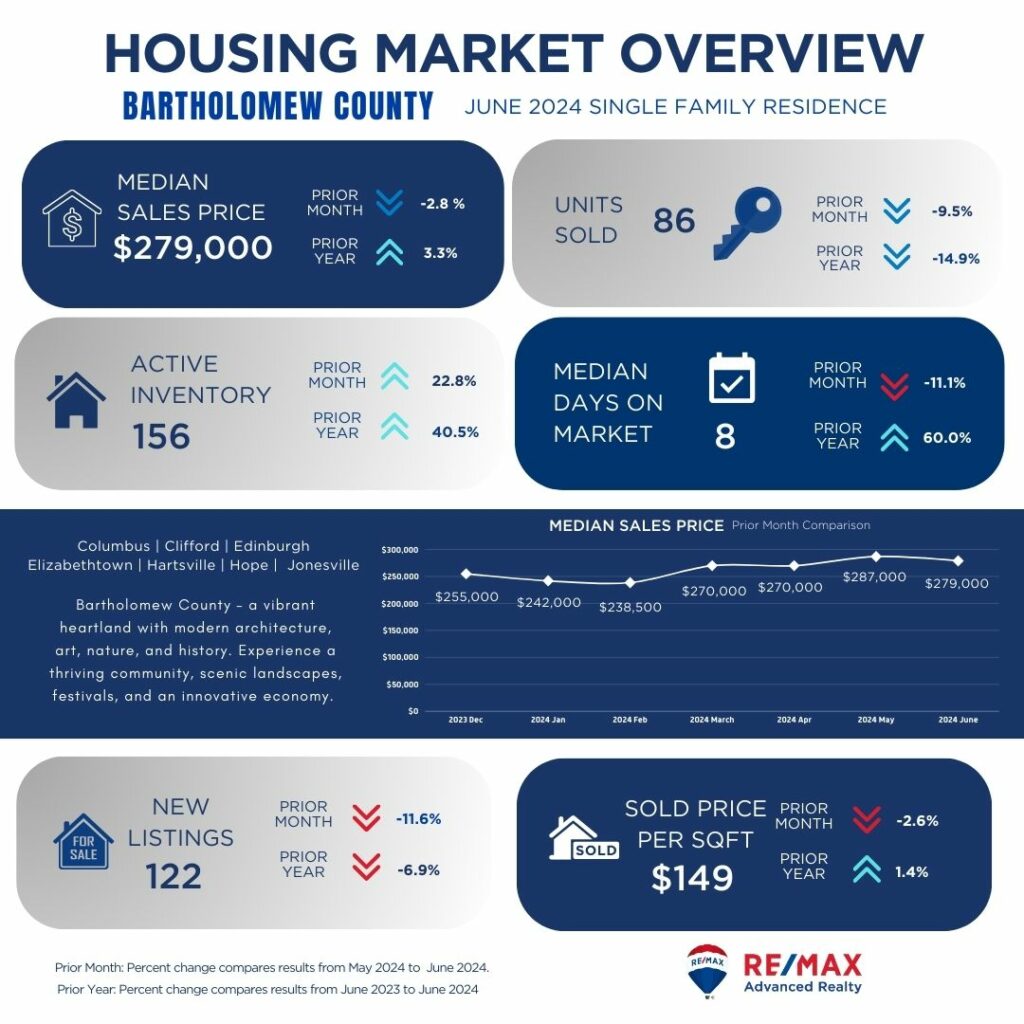
Bartholomew County shows a stable market with a slight decrease in median sales price compared to the previous month but a modest increase year-over-year. The decrease in units sold suggests a slower market pace, providing buyers with more negotiating power. Active inventory has increased, offering buyers more choices, although fewer new listings may limit options. Properties are selling quickly with a low median days on market, indicating continued demand despite some price fluctuations.
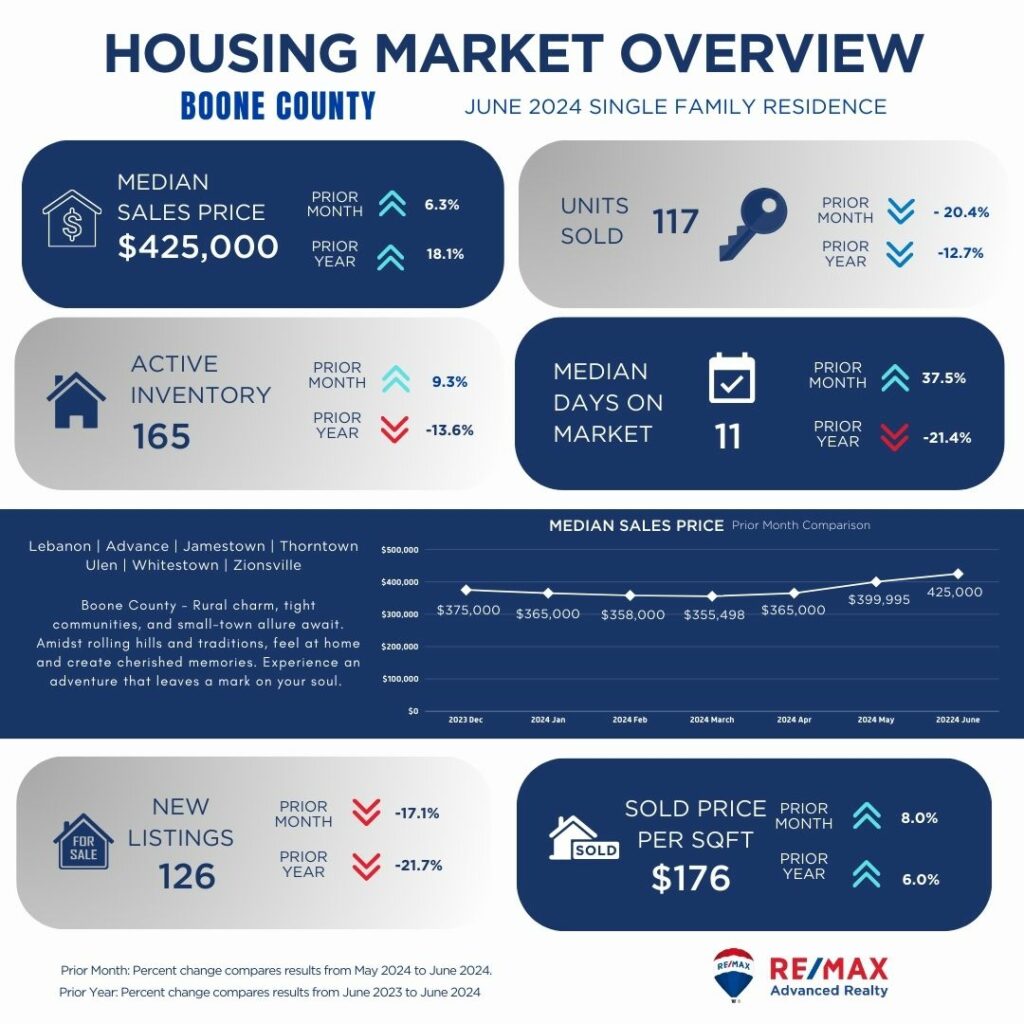
Boone County demonstrates a strong market with a significant increase in median sales price month-over-month and year-over-year, reflecting rising property values. However, the decrease in units sold indicates a slower market pace, potentially due to increased prices and limited inventory growth. Active inventory has risen slightly, but fewer new listings may constrain buyer options. Properties are selling quickly with a low median days on market and an uptick in price per square foot, suggesting continued demand in a competitive market.
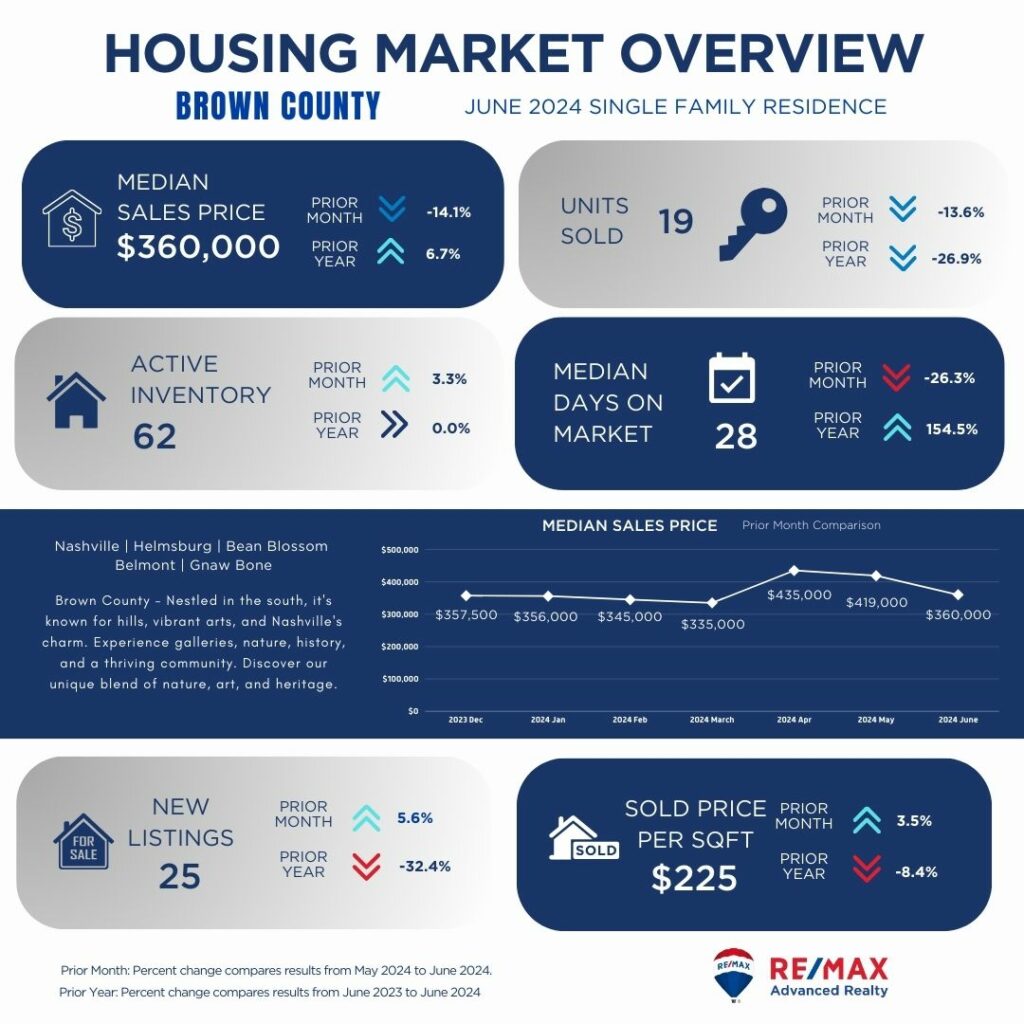
Brown County shows a mixed market with a notable decrease in median sales price compared to the previous month but an increase year-over-year. The decline in units sold suggests a slower market pace, which could provide buyers with more negotiating opportunities despite a stable inventory. Median days on market have decreased significantly, indicating properties are selling faster, but fewer new listings may limit buyer choices. Price per square foot has also decreased slightly, potentially offering buyers more affordable options in this market.
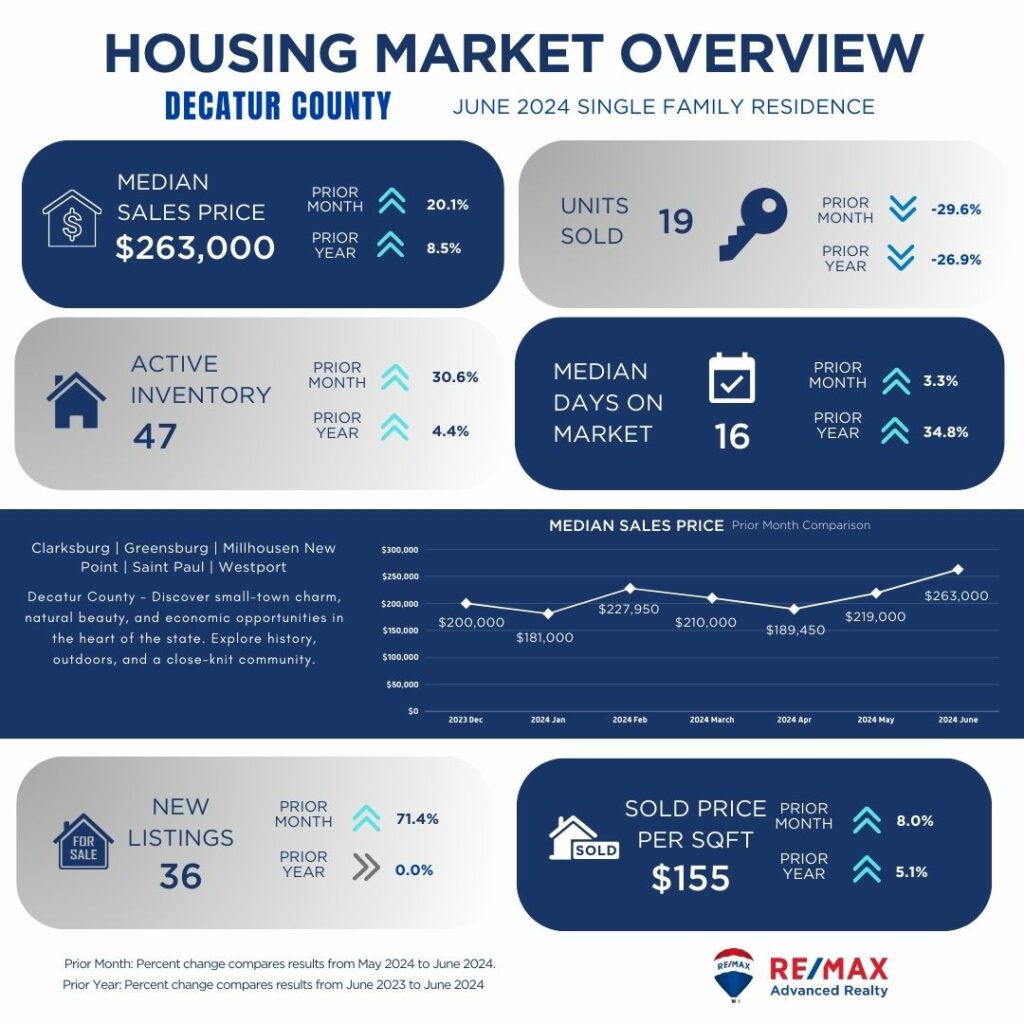
Decatur County displays a strengthening market with a substantial increase in median sales price month-over-month and year-over-year. Despite a decrease in units sold, active inventory has expanded, offering buyers more options. Properties are selling relatively quickly with a low median days on market, indicating strong demand. The increase in new listings further supports market activity, although the rise in price per square foot suggests increasing property values, potentially benefiting sellers.
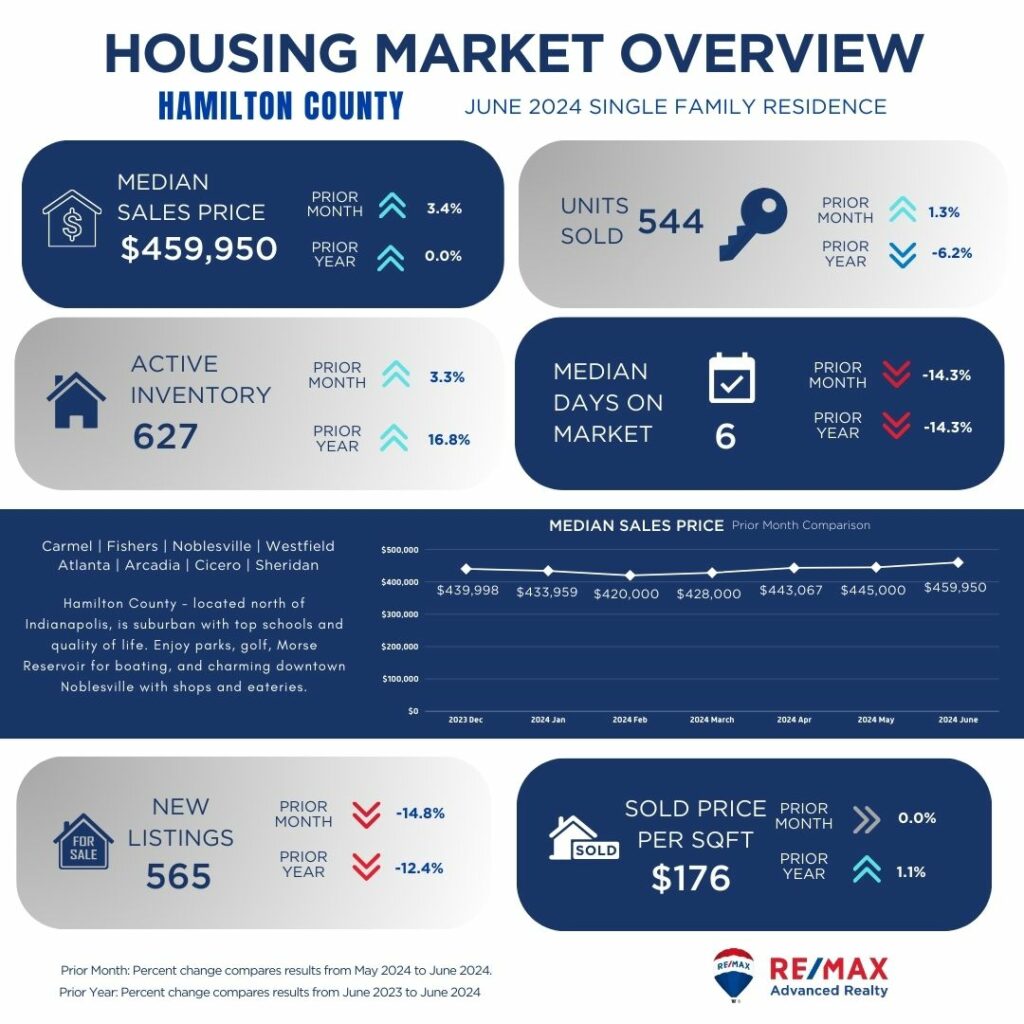
Hamilton County maintains a robust market with a slight increase in median sales price compared to the previous month and stable growth year-over-year. Despite a modest decrease in units sold, active inventory has grown, giving buyers more choices. Properties are selling quickly with a low median days on market, reflecting continued demand. However, fewer new listings may limit buyer options despite a stable price per square foot, indicating a balanced market with steady growth in property values.
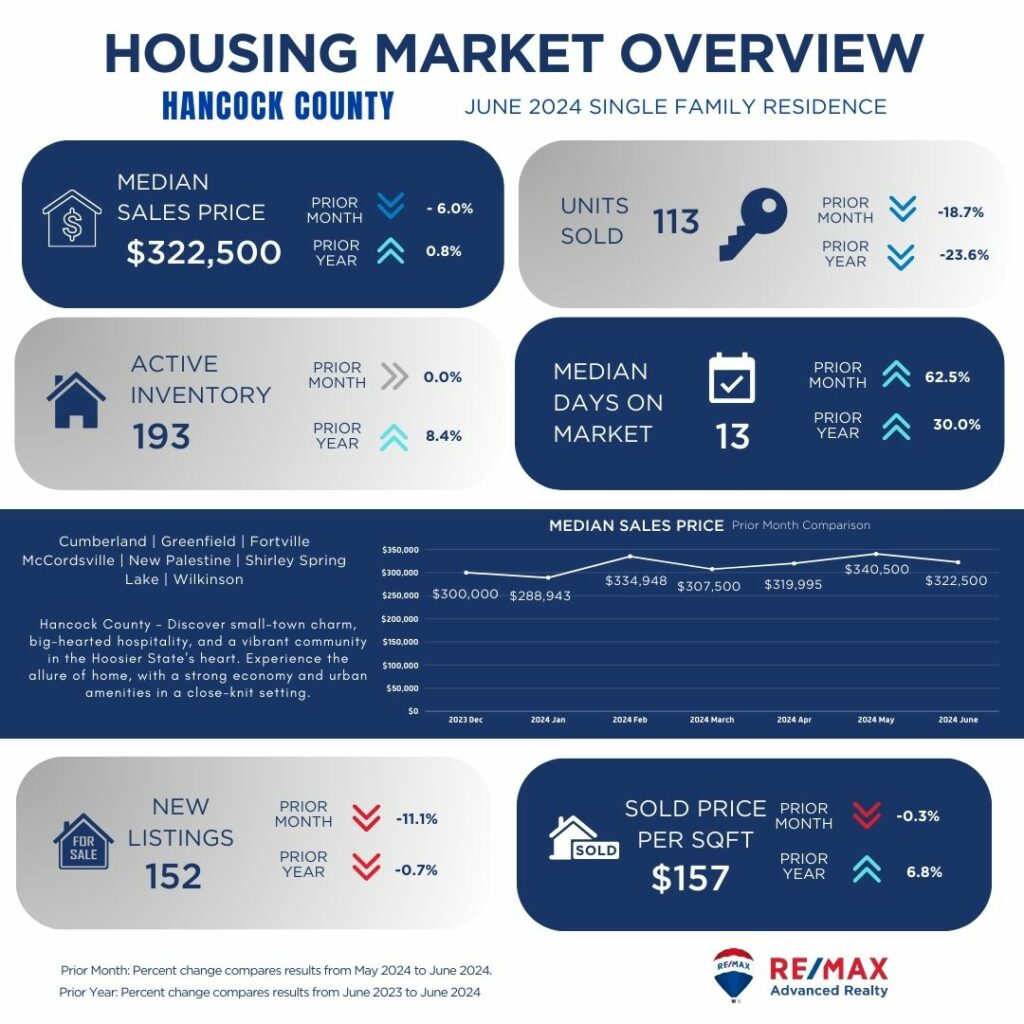
Hancock County shows a steady market with a decrease in median sales price compared to the previous month but a slight increase year-over-year. The decline in units sold suggests a slower market pace, potentially giving buyers more negotiating power despite stable active inventory. Properties are selling relatively quickly with a moderate median days on market, indicating steady demand. Fewer new listings may limit buyer choices, although the slight decrease in price per square foot could offer opportunities for affordability.
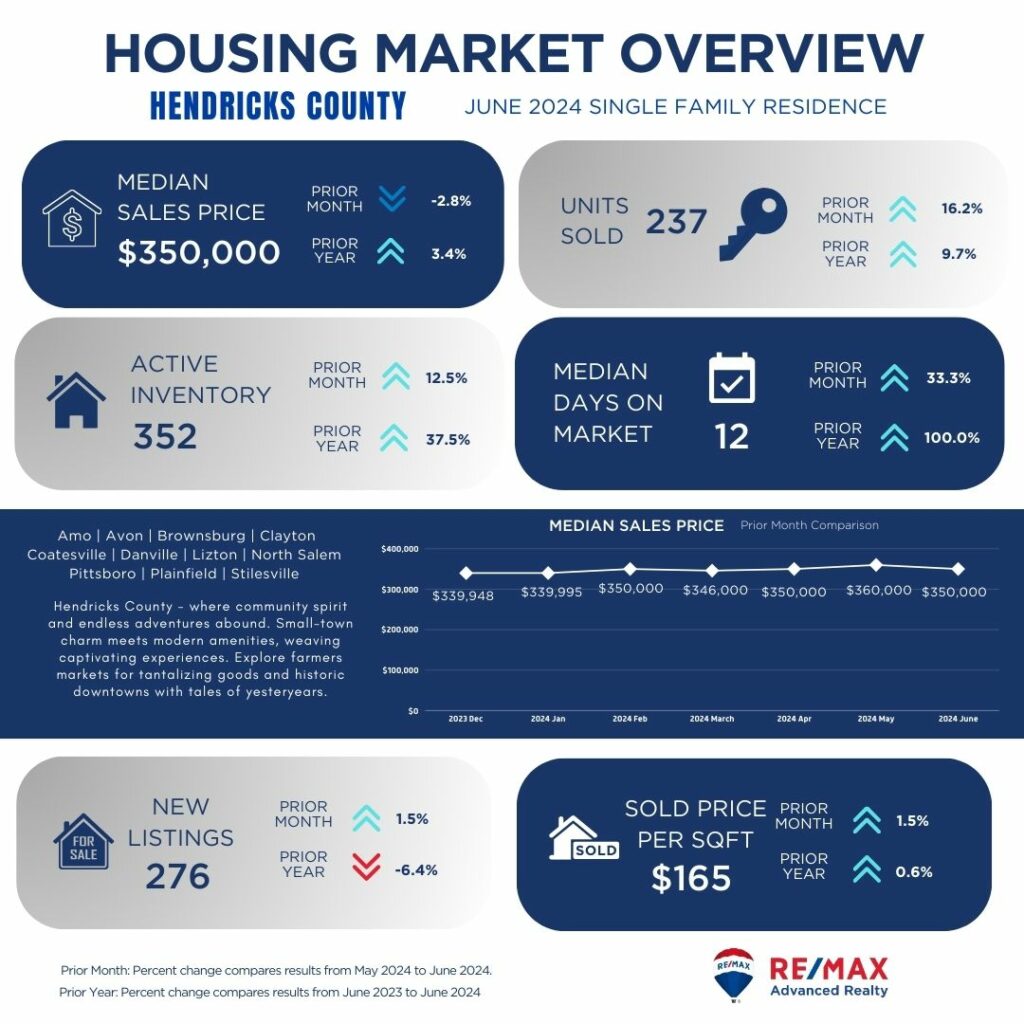
Hendricks County demonstrates a stable market with a slight decrease in median sales price compared to the previous month but a modest increase year-over-year. The increase in units sold suggests continued demand, supported by a growing active inventory. Properties are selling quickly with a low median days on market, indicating a competitive market environment. The slight increase in price per square foot reflects rising property values, potentially benefiting sellers despite fewer new listings limiting buyer options.
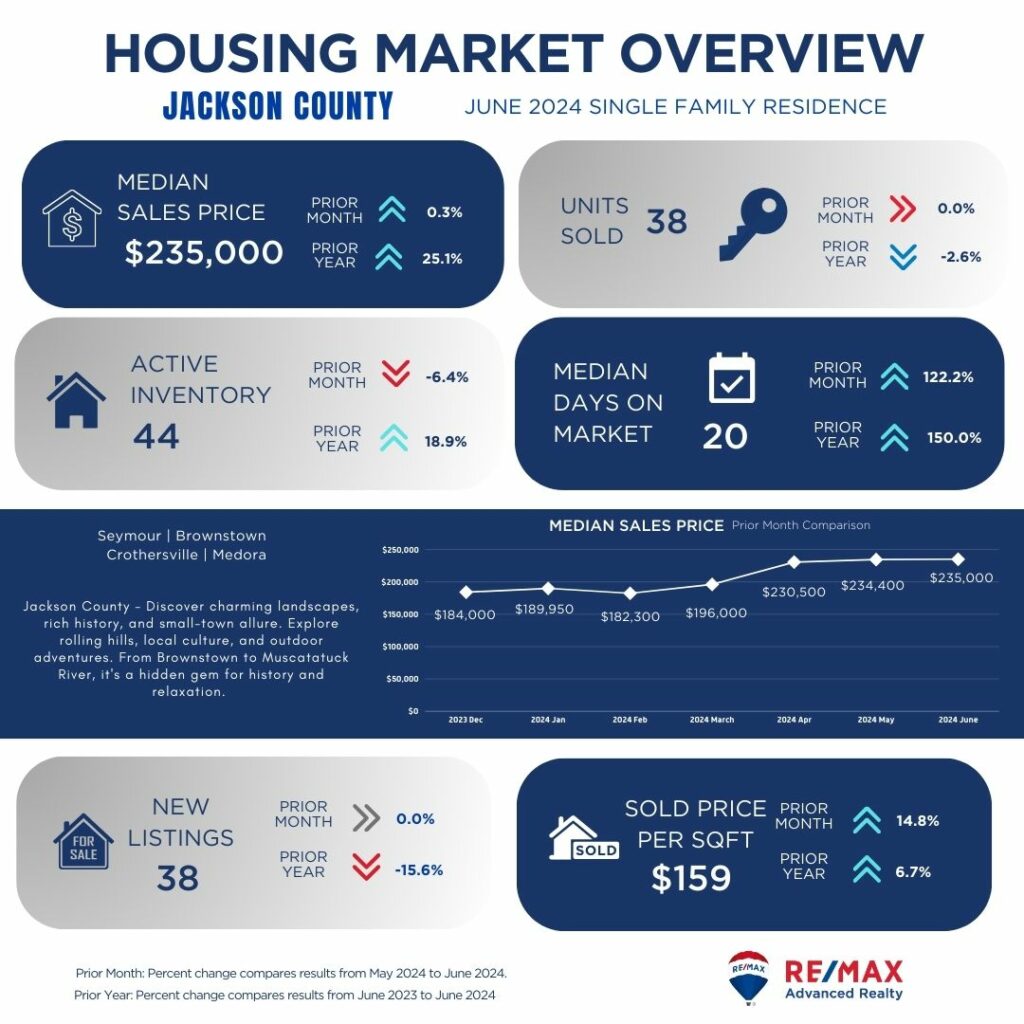
Jackson County shows a resilient market with a stable median sales price compared to the previous month and significant growth year-over-year. Despite a slight decrease in units sold, active inventory has remained stable, providing consistent buyer options. Properties are selling relatively quickly with a moderate median days on market, suggesting steady demand. However, fewer new listings may restrict buyer choices, although the increase in price per square foot indicates rising property values, benefiting sellers.
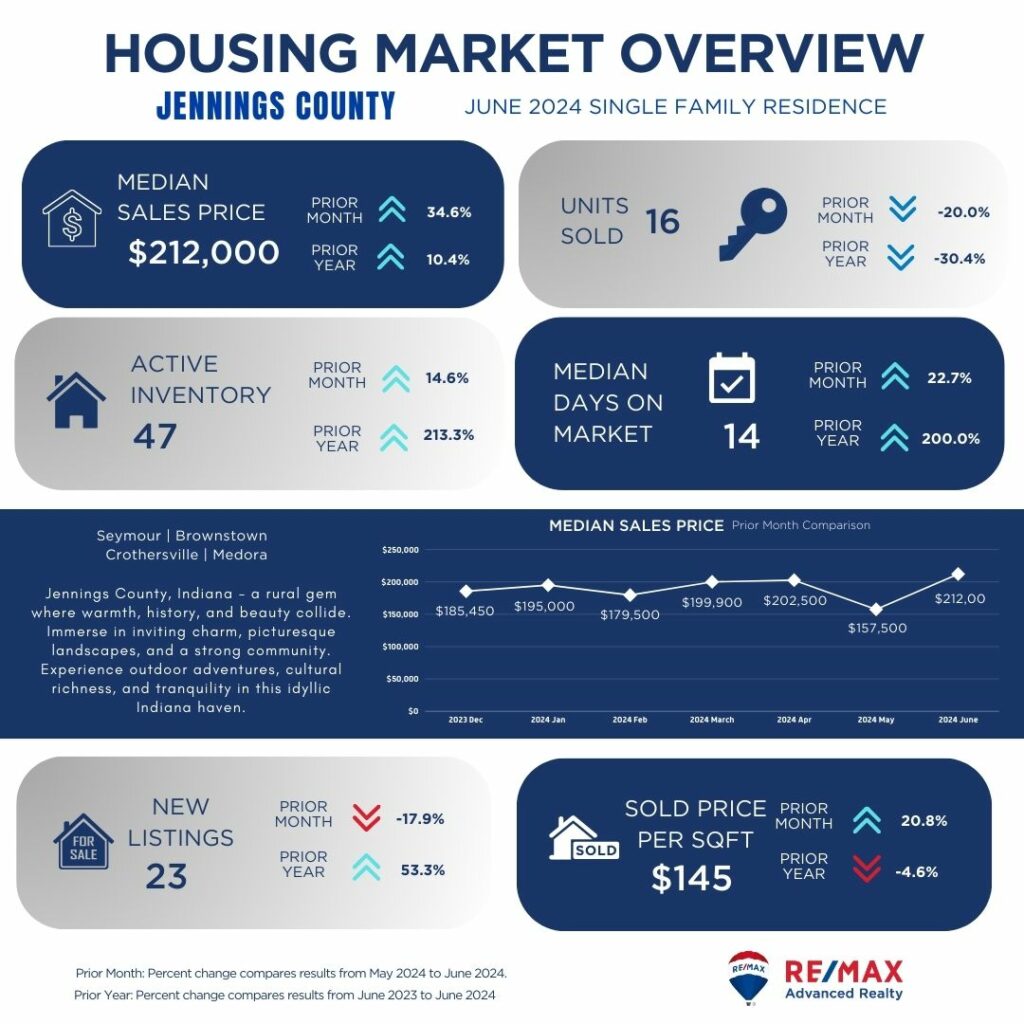
Jennings County displays a strengthening market with a notable increase in median sales price month-over-month and year-over-year. Despite a decrease in units sold, active inventory has expanded significantly, offering buyers more choices. Properties are selling relatively quickly with a moderate median days on market, indicating strong demand. The increase in new listings supports market activity, although the rise in price per square foot suggests increasing property values, potentially benefiting sellers.
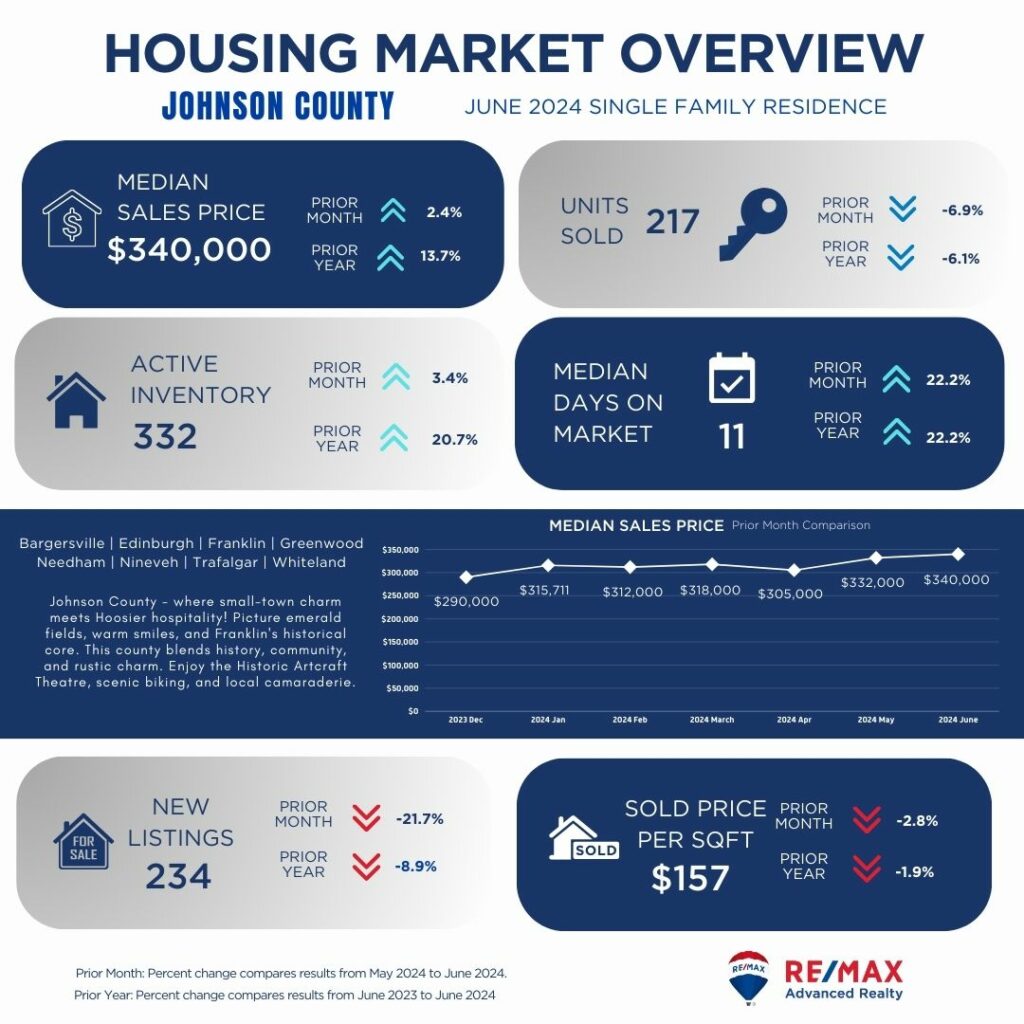
Johnson County maintains a stable market with a slight increase in median sales price compared to the previous month and steady growth year-over-year. Despite a decrease in units sold, active inventory has grown moderately, providing buyers with more options. Properties are selling quickly with a low median days on market, reflecting continued demand. Fewer new listings may limit buyer choices, although the stable price per square foot indicates a balanced market with steady property values.
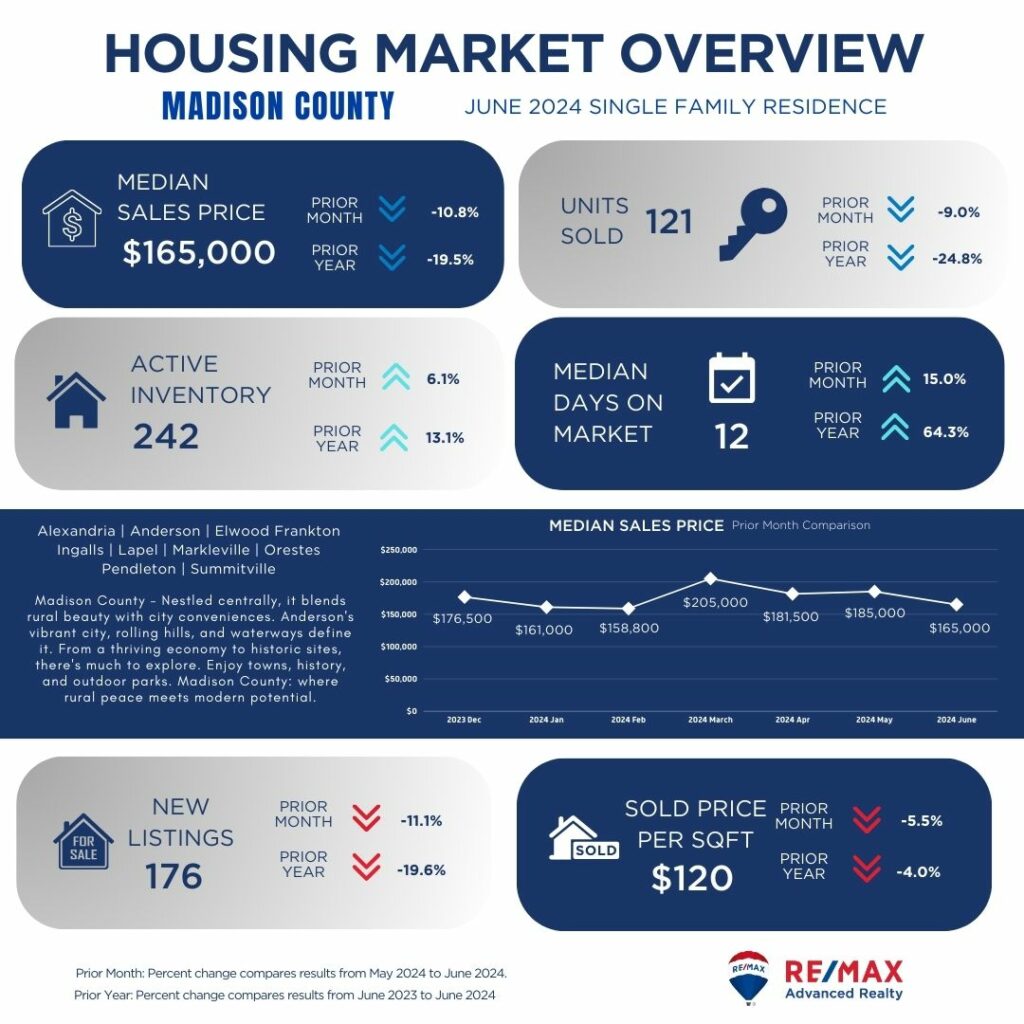
Madison County shows a varied market with a decrease in median sales price compared to the previous month and year-over-year. The decline in units sold suggests a slower market pace, potentially giving buyers more negotiating opportunities despite a stable active inventory. Properties are selling relatively quickly with a moderate median days on market, indicating steady demand. Fewer new listings may constrain buyer options, although the slight decrease in price per square foot could offer affordability in this market.
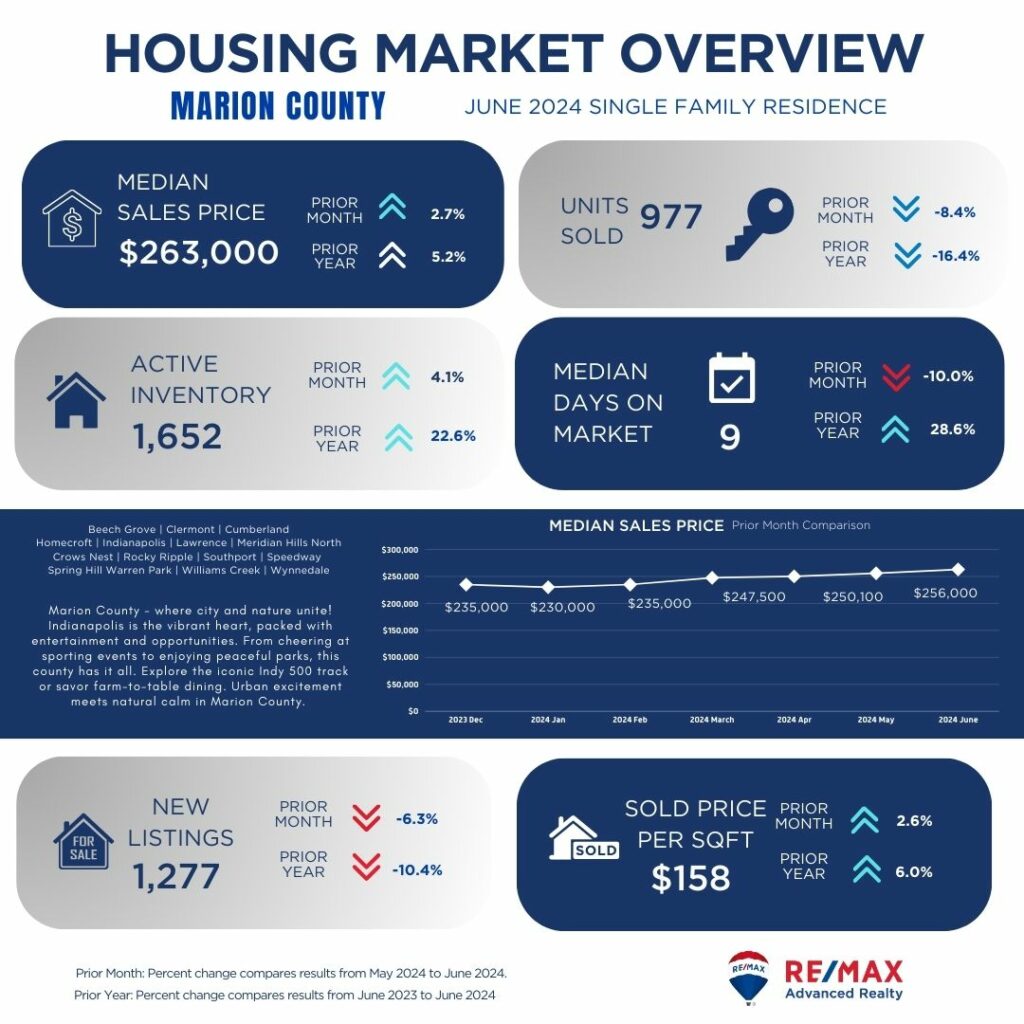
Marion County demonstrates a stable market with a slight increase in median sales price compared to the previous month and moderate growth year-over-year. Despite a decrease in units sold, active inventory has expanded, providing buyers with more choices. Properties are selling relatively quickly with a low median days on market, reflecting consistent demand. However, fewer new listings may limit buyer options, although the stable price per square foot indicates a balanced market with steady property values.
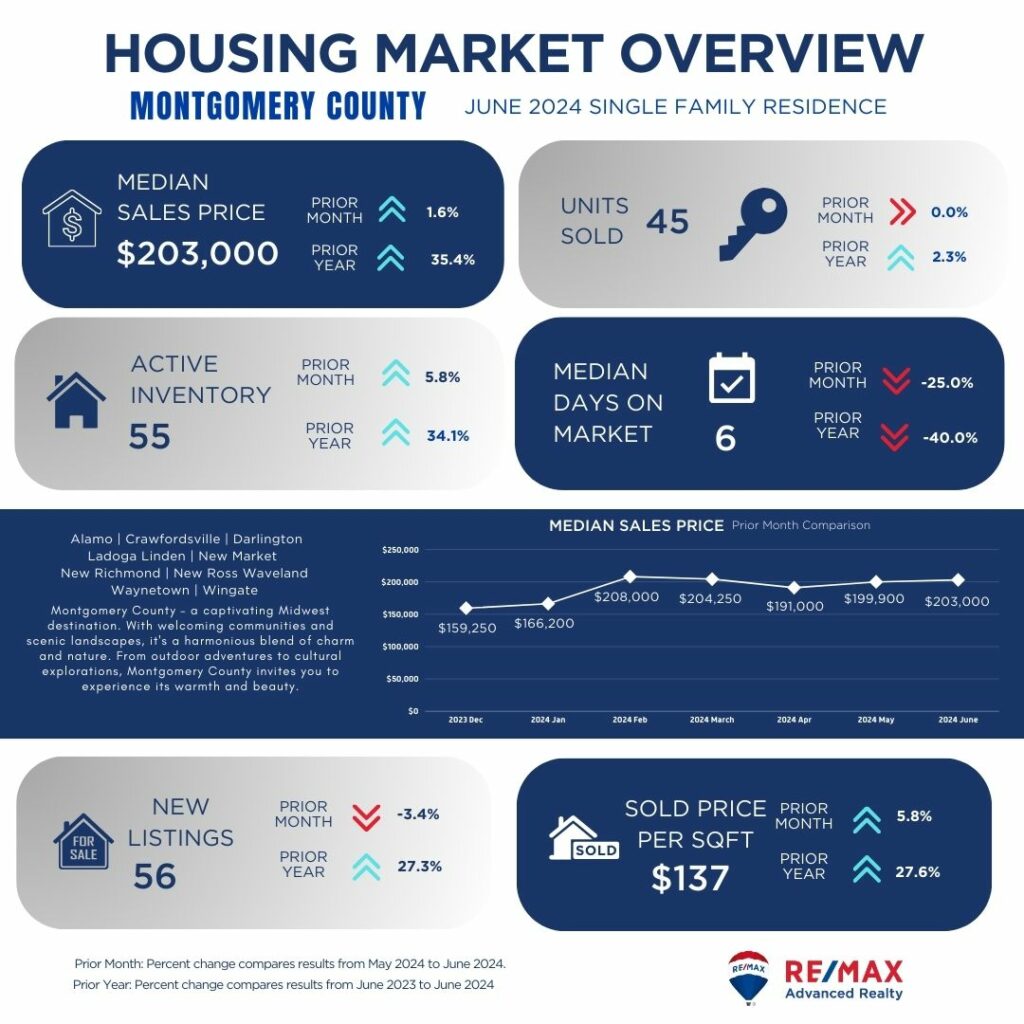
Montgomery County shows a stable market with a slight increase in median sales price compared to the previous month and strong growth year-over-year. Despite a slight decrease in units sold, active inventory has grown, offering buyers more options. Properties are selling relatively quickly with a low median days on market, indicating steady demand. The increase in new listings supports market activity, although the rise in price per square foot suggests increasing property values, potentially benefiting sellers.
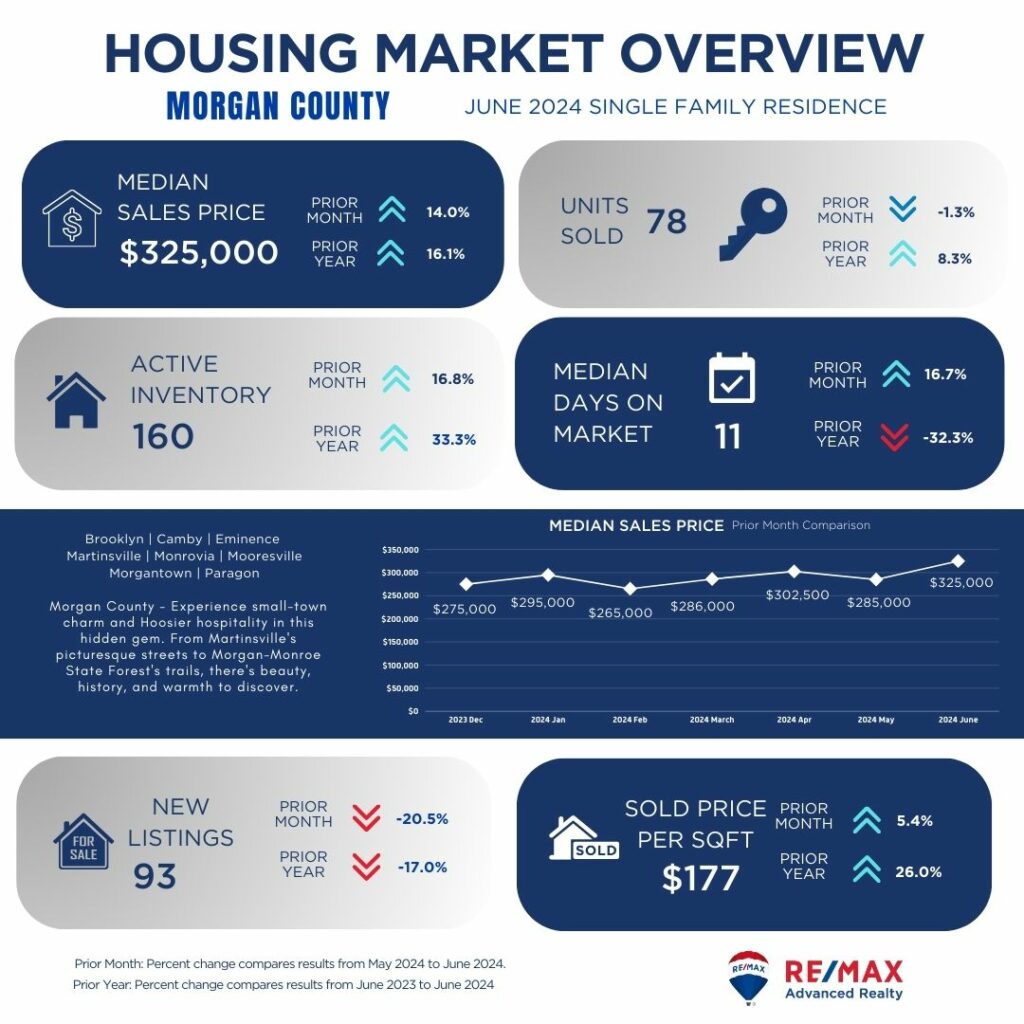
Morgan County displays a robust market with a notable increase in median sales price month-over-month and year-over-year. Despite a slight decrease in units sold, active inventory has expanded, providing buyers with more choices. Properties are selling relatively quickly with a low median days on market, indicating strong demand. The decrease in new listings may limit buyer options, although the increase in price per square foot reflects rising property values, potentially benefiting sellers.
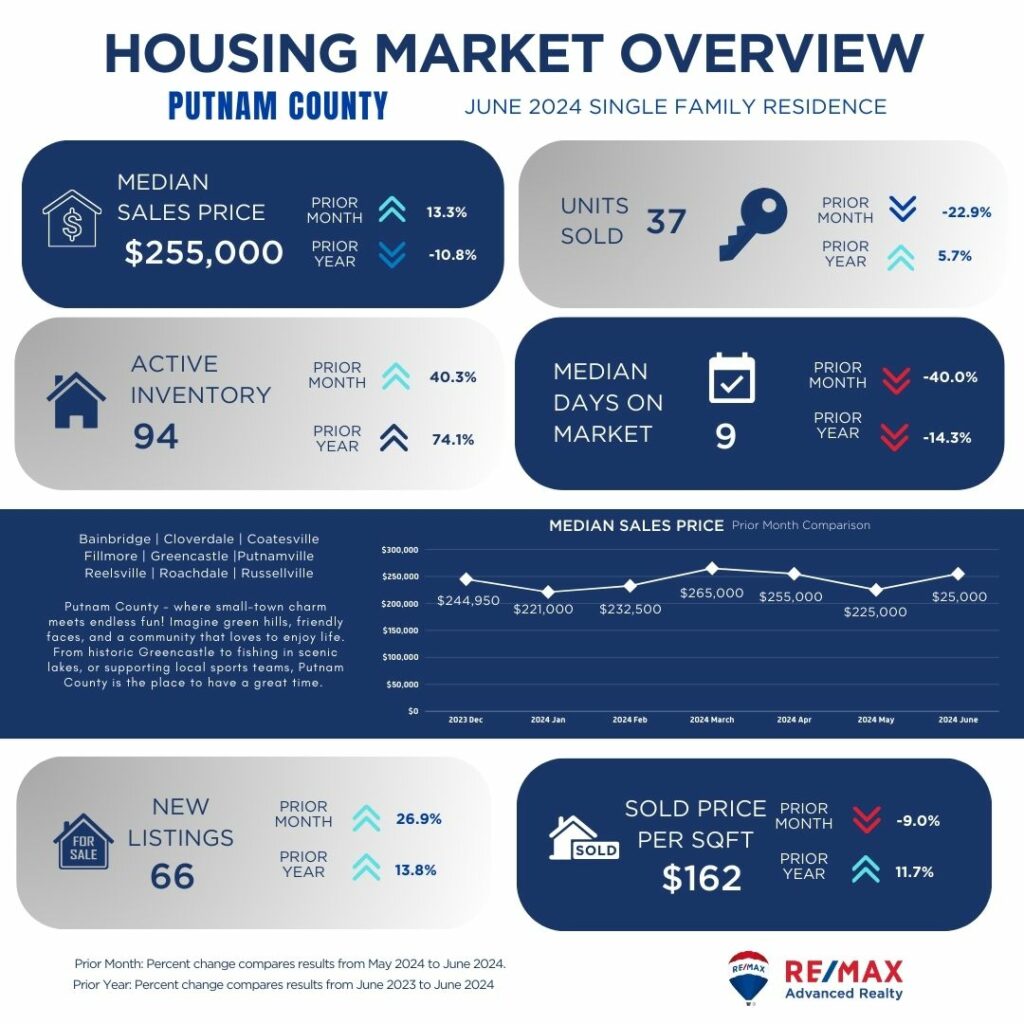
Putnam County shows a stable market with a slight increase in median sales price compared to the previous month and a decrease year-over-year. Despite a decrease in units sold, active inventory has grown significantly, offering buyers more options. Properties are selling relatively quickly with a moderate median days on market, indicating steady demand. The increase in new listings supports market activity, although the decrease in price per square foot suggests affordability, potentially attracting buyers.

Shelby County demonstrates a stable market with a slight increase in median sales price compared to the previous month and moderate growth year-over-year. Despite a decrease in units sold, active inventory has expanded, providing buyers with more choices. Properties are selling relatively quickly with a moderate median days on market, reflecting steady demand. The increase in new listings supports market activity, although the decrease in price per square foot suggests affordability, potentially benefiting buyers.
As we conclude our county-by-county analysis of the Central Indiana single-family homes market, it's evident that each area presents unique opportunities and challenges for buyers and sellers alike. From the rapid pace of Hamilton County to the steady resilience of Boone County and beyond, understanding these trends is crucial in navigating your real estate journey.
Looking ahead, the remainder of the year promises to be dynamic, with shifting market conditions influenced by economic factors and buyer-seller dynamics. Whether you're considering buying, selling, or investing in Central Indiana real estate, our team at RE/MAX Advanced Realty is here to provide expert guidance and support.
Explore our listings, connect with our experienced agents, and let us help you achieve your real estate goals in this competitive market. Contact us today to schedule a consultation and take the next step towards finding your dream home or maximizing your property's value. Trust RE/MAX Advanced Realty for insightful market analysis and personalized service, ensuring a smooth and successful real estate experience.
Are you dreaming of living on your own property?
If yes, you’re not alone.
In our network alone, we know a lot of people who want to have their own home. It’s no surprise though; there are a lot of advantages when you become a homeowner. However, there are several factors to consider while making such a big decision. So before you choose a new home, be sure to read this post first.
In this article, we will talk about what problems to look for when buying a house. From structural issues to hidden flaws, knowing what issues to check can save you time, money, and headaches.
Before rushing into something, especially one that’s as huge as buying a home, it’s important to thoroughly inspect it. Some of the problems include:
When a door refuses to close, it's likely because the frame has moved and the door is no longer square. To get the door to close in certain cases, the homeowners might have chopped a small piece from the door. Therefore, be cautious if you see some trim removed from its top or bottom. Although the door may shut correctly, the issue that caused the shifting still persists.
The majority of poured concrete foundations will eventually develop hairline fractures, although they are not a sign of an issue. However, it's a good idea to have a foundation contractor look at the region if a crack is bigger than 1/2 inch. This also applies to cracks that seem to have been fixed lately. Large fissures may be a sign of a shaky foundation.
While most mold isn't as dangerously deadly as, say, Stachybotrys, breathing in mold spores can cause headaches, respiratory ailments, and other ailments. Additionally, mold growth may be a sign of structural issues with a home. If you detect the smell of mold, look for leaks in crawl spaces and basements, under sinks, and around windows. Wood members, drywall, and carpets are examples of construction materials that may need to be replaced if a leak has been present for a long time.
It is advisable to identify the symptoms prior to making an offer because the existence of live termites has the potential to jeopardize a housing contract. Little mounds of microscopic brown droppings on the ground close to a wall are one obvious sign. Additional indicators include the sound of hollow wood and the existence of mud tubes on a foundation. Because termites reside underground, they dig tiny mud tunnels along walls and foundations to shield themselves from sunlight while they go from their underground nests to the wood they are eating.
Building supplies and water don't mix. Over time, the slow leakage of water from a window or roof can cause structural wood members to deteriorate. Water stains that have a brown or yellow tint could indicate a plumbing issue on a higher floor. Don't make an offer until you have an idea of the source of the leak and the extent of the harm it has caused.

No matter how charming and comfortable the home is, a drooping ceiling is a cause for concern. Even a small amount of sag in the ceiling can indicate a structural movement that is causing the drywall to come free from the ceiling joists, an insect infestation that is gnawing away at the joists, or a roof leak. Whatever the reason, the cost of repair may be high.
Put this one firmly under the category of "buyer beware! While many individuals are competent at doing small repairs around the house, very few are qualified to build an addition that complies with building requirements. An addition constructed by the homeowner without the local building authority's supervision may have structural, electrical, and plumbing flaws.
Not every fresh coat of paint signals a problem. Actually, before offering their homes for sale, sellers frequently paint the walls a fresh coat. However, if fresh paint appears out of place, as in a room where only one wall has been painted, you should question its application. Spot painting may be an indication that the seller is attempting to hide a wall flaw, like a water stain.
The homeowner may be attempting to mask the smell of something else, such as pet urine-saturated carpeting or mold growing beneath the sink, if you walk into a house and are immediately hit by a strong scent of air freshener or if essential oil diffusers are steaming away in every room. urge for a second showing and urge the seller not to use air freshener before you come if you're interested in the place.
A yard should slope away from the home by at least 2 percent in order to keep water away from the foundation wall. After it has rained, drive by the house you like. Puddles of standing water could indicate a drainage issue in the yard. The most dangerous puddles are those that are close to the foundation since even the smallest crack might allow water that flows along a foundation wall to seep into a basement.
While the typical AC unit lasts 10 to 12 years, furnaces typically last 15 to 18 years. HVAC (heating, ventilation, and air conditioning) units lose efficiency as they get closer to the end of their useful lifespan. Because of this, operating them will cost you more in energy expenses, and they might not adequately heat or cool the house. Additionally, there's a potential that one or both of them will completely stop functioning, in which case you'll have to pay to replace them.
The most crucial consideration when purchasing a home is, as real estate brokers like to say, "location, location, location." If a number of properties in the neighborhood are for sale, this may be a sign of a problem with the location, such as an increase in crime or a proposed landfill nearby. Include investigating the community as a regular aspect of your house search.
It pays to properly inspect the roof because replacing a roof is an expensive project that can cost anywhere from $6,000 to $20,000 or more, depending on the size of the roof and the type of roofing materials used. The roof may need to be replaced if there are any of the following symptoms: exposed nail heads, missing or broken shingles, or shingles that curl up at the corners. A roofer with experience will be able to confirm.
Some sellers offer their properties "As Is" for good reason—they just don't want to deal with potential issues that could come out during an expert inspection. In essence, they are saying that they will not foot the bill to address any issues that arise. You can still have the house inspected, which is a good idea, but if the inspector discovers mold, termites, or other issues and you decide to move forward with the purchase, you will be responsible for paying for any repairs
A house's duration on the market before it sells might vary depending on a number of factors, but the average period from listing to closure is 68 days, according to real estate expert Zillow. In general, steer clear of a house that has been on the market for months or years; speak with a real estate agent about the typical time in your neighborhood. There's a good chance it has undiscovered issues that would be costly to fix.
Examine the underside of the roof eaves (the soffits) from the outside of the house. One or more intake vents should be visible to you. Extra exhaust vents ought to be placed at the top of gable walls, on the face of the roof close to the ridge, and along the roof's ridge. An attic's decking (or roof sheathing) and shingles themselves may sustain damage in the summer heat if there is insufficient ventilation.
During an open house, potential buyers try to determine whether a house is a good fit for them by asking questions such as "Is the kitchen large enough?" or "Does it have enough bedrooms?" Do the bathrooms require remodeling? However, it's important to remember that a home must do more than merely fulfill a list of requirements. Ultimately, for the majority of people, it represents their largest investment yet. It needs to be in good shape as well.
The usual listing contract contains a disclosure form where the seller is required to detail all known problems of the house in order to aid potential purchasers in assessing the condition of a property. However, it's possible that not all of the flaws are disclosed by the seller, and some sellers may purposefully leave out issues in the hopes that you won't see them. Click through to discover some frequent warning signs that should cause you to reconsider your purchase in order to avoid unforeseen maintenance costs.
Before you jump to make an offer on a house that is priced much below market value, find out why. If the septic system overflows the day you move in and raw sewage fills your shower, you won't be getting a great deal. Often, really cheaply priced homes have costly issues that need to be fixed. To ensure that you know exactly what you're receiving before you buy, take the time to employ experienced inspectors.
Purchasing a home through a for-sale-by-owner (FSBO) may seem like a great way to save a few thousand dollars in agent costs, but you may wind up having more difficulty than you anticipated. Because real estate transactions are complicated, you risk purchasing a home with significant issues with the deed or the construction if you don't have an agent to walk you through the process. Make sure you speak with a real estate attorney before placing an offer on a for sale by the owner (FSBO).
Floors that are slightly uneven can be attributed to normal settling, but if the slope is apparent, it may indicate a foundation issue, a damaged floor joist, or rotten support beams. If there are one or more sloping levels in the house, it makes sense to have a structural engineer inspect the property because fixing structural issues can run into thousands of dollars.
Inspecting a home thoroughly might sound like a daunting task; however, spending enough time to look for issues can save you from high expenses and stressful situations.
Whether you're buying your first house or your third, purchasing real estate will always be stressful. Why? Because there will always be a challenge in the real estate market, such as home prices that are beyond reach, increased mortgage rates, and a shortage of inventory.
Knowing what is ahead and surrounding yourself with experienced individuals who can offer guidance are the keys to making it less frightening.
In recent years, there has been a great deal of fluctuation in the property market. If you're attempting to purchase a property, it's crucial to understand the current status of the housing market since it will affect your capacity to make a successful bid. That said, before you start your journey to buying a home, take some time to educate yourself about the current state of your local market.
A rise in the supply of homes would lessen the pressure on home prices to rise by counteracting the demand from buyers. In addition to lowering the entire upfront costs, a lower home price may also result in a cheaper mortgage payment.
List the things you need and want in your dream home as well as the community you want to live in so you can focus on your search.
Use reputable real estate websites, such as Realtor.com, Redfin, Zillow, RE/MAX, and Trulia to get a sense of the kind of homes that fit your requirements. Take note of the home prices to see if they are within your means. If not, you might have to narrow down your search parameters or make some compromises.
One of the largest financial commitments you will ever make is purchasing a home, so before you start looking at properties, keep your finances in order.
Understand your current financial situation. To assess whether you can afford to make monthly mortgage payments, mortgage lenders will examine your cash reserves, income, and debts as well as obtain a copy of your credit report. A FICO score of 620 or above is typically required by lenders to approve a conventional loan.
You may check your credit report for free from each of the three major credit reporting bureaus: Equifax, TransUnion, and Experian every week at AnnualCreditReport.com. Requesting reports from each agency is a good idea, and you should carefully check over them as there may be inconsistencies or errors in the material.
Look for local real estate brokers and arrange for introductory calls or meetings. It's a good idea to interview a few and choose the agent that is educated about the area you're looking to buy into and suits your personality and communication style. A good real estate agent will assist you learn about the home-buying process, highlight discrepancies between pricing and expectations, and provide you with previously unconsidered information.
Don't just get prequalified, get pre-approved. What's the difference, you ask?
A mortgage pre-approval is a comprehensive process where a lender verifies financial information, such as W-2s, tax returns, pay stubs, assets, and credit to determine what loans you could be approved for, the amount you can borrow, and what your interest rate could be. Prequalification is more similar to an approximate estimate of what you can borrow. This might assist you in determining how much you can pay and show home sellers your seriousness about making the purchase.
In difficult economic times, having a solid credit history and financial profile is especially crucial, as lenders are less inclined to take on customers who pose a larger risk of loan default.
Along with encouraging you to search online for additional properties you might be interested in, your real estate agent will probably show you listings that fit your needs and budget. Although in-person tours are preferred by most buyers, if you are unable or unwilling to see the property, you can still obtain a virtual tour.
No matter what you choose, virtual or personal home viewings, start looking early to stay ahead of the competition. Once the prices decrease, home buyers will start to go out, look for homes, and close deals if you haven't started yet, someone else might have the home you always wanted.

It's time to discuss placing an offer with your agent when you've located the place you want to call home.
To help you decide how much you think the house is worth, check the sale prices of nearby comparable homes that have previously sold. A list of real estate comparables (comps) that illustrate the prices paid by buyers for comparative, previously sold properties in the same neighborhood can be compiled by your agent. This may help you determine the appropriate amount to offer.
When you submit your offer, the seller has three options: accept, reject, or counter. During the pandemic, buyers could not afford to negotiate and sellers maintained control. The good news is that the market is currently somewhat more balanced now compared to the previous years.
Buyers can bargain more to get the best deal possible within their budget, but note that the price of the listings—especially the expensive ones—determines the outcome.
Earnest money is deposited with a third party, such as a real estate broker, law firm, or title business, once your offer is accepted. This money is kept in escrow until closing and can be used toward your down payment or closing fees. Known as a good faith deposit, earnest money signifies your seriousness as a buyer and is often between 1% and 5% of the total cost of the home.
Now that the sale is on hold, it's time to start the due diligence procedure, which includes the home inspection. A house inspection is a qualified inspector's visual evaluation of the property's condition, and the results can assist buyers in making better decisions.
If your purchase offer contains a condition for a house inspection, you may choose to walk away from the deal entirely or bargain for repairs.
You should submit your mortgage application as soon as possible after you get into a contract. Choose a lender who best meets your needs by shopping around and comparing mortgage offers. Your interest rate and the amount you qualify for will be estimated by your lender.
After you're pre-approved, your lender might also provide you with a mortgage rate lock, which is normally good for 60 days or occasionally longer. When interest rates are expected to rise, a rate lock is an excellent idea. However, you cannot simply switch to a lower interest rate if rates fall.
To make sure the agreed-upon sale price is equal to the property's market value, your lender will usually need an appraisal of the asset. The appraisal is frequently included in the overall amount of closing expenses for a house.
A few days before closing, conduct a final walkthrough. This will help you verify that the house is in good condition and/or in the same condition as when the offer was made. For homes that have issues, this will also help confirm if the agreed repairs have been made.
The actual closing process is quite simple and calls for signatures attesting to the ownership transfer. Depending on your state, you may sign documents in person with a representative of your title insurance firm or electronically, if that is permitted.
The actual closing procedure only requires signatures attesting to the transfer of ownership and is rather straightforward. You may sign documents electronically if allowed by your state, or in person with a representative of your title insurance company.
We hope that we've helped you understand the process you need to go through when buying a home. As always, our team at RE/MAX Advanced Realty is here to help. Just send us a message or leave a comment if you have questions about purchasing a property.
One of the most important phases in the home-buying process is closing because it's at this point that the buyer and seller exchange possession of the property. Unless they are performing a dry closing, the seller will often get payment for their house.
When a real estate closing is finished without any money being transferred—including closing costs—it is referred to as a "dry closing." Generally speaking, when the funds are approved but non-transferable, dry closings expedite the closing process for a home or property.
A dry closing will be started by the seller or the buyer, and it commonly happens when the funds are delayed. For instance, the buyer may still need to fulfill a last requirement, which could take some time to accomplish, even though the money for the mortgage has been authorized.
Alternatively, there can be a problem with the property that the seller is attempting to resolve. The buyer and seller decide on a dry closure as an alternative to postponing or canceling the transaction.
A wet closing involves paying the money for the sale of the house all at once and completing the real estate deal. Every real estate contract is signed, and the money is distributed right away. All 50 states allow this kind of closing, which is the most popular.
A dry closing, on the other hand, allows the buyer and seller more time to finish the real estate transaction. They proceed through closing, but until the money is sent, the deal isn't finished. Furthermore, a dry closing is only permitted in some states.
These are the states that allow dry closing:

There are times when a dry closing is more convenient for all parties. However, consenting to a dry closing entails a certain level of risk. This could consist of:
Is it ever a good idea to have a dry closing, assuming that's legal in your state? Perhaps, in light of your circumstances. Dry closings are a way to keep the real estate deal going forward in the event of problems.
Accepting a dry closing offers the lender an extra few days to smooth things out if the money transfer is taking longer than anticipated. Please ensure that you understand the dangers before consenting to a dry closing.
There's no guarantee that the real estate deal will fail if you're contacted regarding a dry closing. In fact, a dry closing can keep things going so that everyone concerned gets what they desire. However, you have to understand what it really means first, what to expect when you choose it, and if it’s the right choice for your situation.
"Make money buying real estate."
"Now's the best time to buy a home."
"Buy houses for pennies on the dollar."
These are the kinds of remarks that people typically relate to foreclosures on real estate. In reality, foreclosures on real estate rarely result in instant financial success. Of course, there are great deals to be taken advantage of but still, it's not gonna offer easy money to anyone. Nonetheless, you can get those possible benefits through a lot of effort and devotion.
In this post, we'll answer the following questions:
What does foreclosure mean?
What are the pros and cons of buying a foreclosed property?
What are the steps in buying a foreclosed property?
So without further ado, let's get started.
Homeowners rarely buy a home outright or in cash. To finance the purchase, they typically obtain a mortgage from a bank or other lender. After that, it is the buyer's responsibility to pay the lender on time.
However, buyers occasionally miss these installments. The University of Illinois lists the following as typical causes:
Divorce resulting in financial strain
Huge medical expenses, especially when the homeowner is uninsured or underinsured
Death of the primary income earner
Loss of source of income (example: job or business)
Liens are legal devices included in all mortgage transactions. The lender's monetary interest in the house is safeguarded by a lien. If the borrower defaults on the loan, it enables the institution to take possession of the asset.
Banks typically assist financially troubled homeowners in attempting to resolve their issues. If those don't work, the bank will use the mortgage contract's lien to foreclose on the house and seize possession of it.
The bank will then either sell the house directly or put it up for auction. There are situations where the present owner will close a short sale. Through this procedure, a buyer can purchase the house at market value, even if that sum is insufficient to pay off the remaining mortgage balance.
Now, the event where the lender or the banker seizes the home, that's is called foreclosure.
Buying a foreclosed home has the following advantages:
Without a doubt, foreclosures typically come with a lower price tag or are priced below market value than other types of real estate. This is because the lenders who set their prices just want to get rid of the property faster.
Compared to regular residences, foreclosure properties may have a different bidding and purchasing procedure. But if the property isn't being sold in a cash-only auction, you might be able to get a loan to buy a foreclosed home.
One may obtain a traditional loan or one backed by the government through the Department of Veterans Affairs (VA), Federal Housing Administration (FHA), or S. financing from the United States Department of Agriculture (USDA) if the house is livable.
Lending secured by the government helps lower the cost of becoming a homeowner. However, the property needs to match the loan's minimal property requirements to be eligible for the loan.
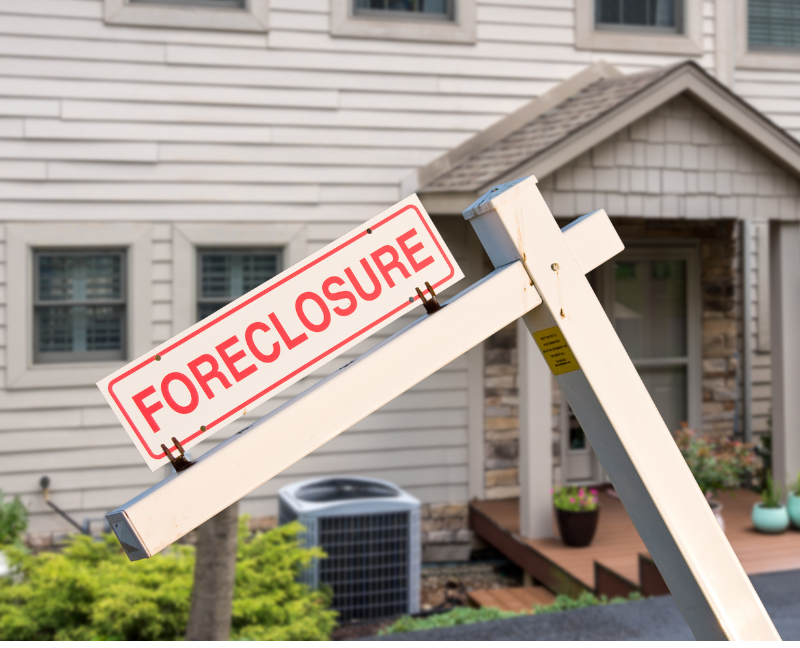
Buying a foreclosed home has the following disadvantages:
There might be a chance that the foreclosed home you're buying has been neglected by its former owners. If that's the case, you might need to not only check the problems but also, spend money to fix them.
Take Note: The primary goal of the lender is to get their money back as soon as possible, which nearly always entails an as-is selling.
If you don't have a lot of money to spend on repairs, you shouldn't purchase a foreclosure.
Just because a house is foreclosed upon legally does not mean it is abandoned. Squatters may be drawn to foreclosed properties since they are sometimes vacant for months or even years. You have the right to evict a squatter who occupies the house if they do. However, evicting them may not be easy. Sometimes, it might take months to complete the eviction and you have to spend thousands of dollars for legal costs.
Here are some questions people commonly ask before purchasing a foreclosed property:
Purchasing a repossessed property comes with risks related to neglect, damage, and property degradation. On the other hand, buying a foreclosed home is beneficial since it lets you save money because you are getting the house at a reduced price.
When determining whether a foreclosure is the best option for you, consider your financial circumstances and ability to make repairs. Because the property might require more work than you anticipated, weigh the risks involved in your investment. Consider all the options carefully before determining if purchasing a foreclosed home is a wise move for you.
Whether purchasing a foreclosed home is a wise investment depends in part on your real estate investing objectives.
For those looking to purchase a home at a reduced price or below market value or keen to restore and customize a property, purchasing a foreclosure may present a special opportunity.
However, you should also consider the disadvantages it might have, such as the amount you might spend fixing the property.
Nonetheless, knowing whether it's the right property for you or not depends on your real estate goals and circumstances. If you decided to pursue a foreclosed property, we’ve written a detailed guide on what to expect when buying a foreclosed home.
No-wake lakes in Indiana offer peaceful boating for water enthusiasts. Flint Lake, Lake of the Four Seasons, and others have "no-wake" policies to keep boat speeds low for kayaking, paddleboarding, and fishing.
The limits protect the ecology, reduce shoreline erosion, and provide a peaceful setting for residents and visitors to enjoy the scenery and pleasure without high-speed watercraft.
The calm charm and conservation efforts of Northwest Indiana's no-wake lakes attract nature enthusiasts and those seeking a quieter, more relaxing boating experience in dramatic scenery.
In the first and second parts, we discussed what are the lakes in northwest Indiana and the Indiana all-sports lakes. So, in this last part, we will tackle what are the no-wake lakes in Indiana.
No-wake lakes, such as Fish Lake in Walkerton, Indiana, give prospective homeowners the chance to live near water and take in the tranquil serenity of the outdoors.
The advantages of this are that no-wake lakes in Northwest Indiana, like Flint Lake and Lake of the Four Seasons, are ideal for kayaking, row boating, or pontoon rides, offering a tranquil, serene environment, making them better suited for individuals seeking a peaceful and quiet setting rather than those desiring high-speed recreational activities, providing better options for those who want to enjoy fishing on a calm lake.
The disadvantage of this is that the popular no-wake lakes such as Flint Lake and Lake of the Four Seasons restrict boating to non-motorized boats, trolling motors, or slow pontoon boats, typically situated in more rural areas, often featuring lakefront homes for sale, making them highly sought-after destinations for those seeking a serene, rural lifestyle within a no-wake lake community.
The following is a list of lakes in Indiana that are considered to be no-wake zones;
Upper and Lower Fish Lakes make up Fish Lake, which is two lakes. Both Upper and Lower Fish Lakes are 273 acres. No-wake lakes prohibit motor boats: trolling or low-horsepower outboard bass boats and pontoons. Lake fishing is permitted.
Few amenities near Fish Lake. This is because the lake is rural. Laporte, 9 miles northwest, and Walkerton, 7 miles southeast of Fish Lake, have various facilities.
Two-bedroom, one-bathroom homes with 1,200 square feet are common in Fish Lake. Those houses offer great value for a Northwest Indiana riverfront home.

© www.lakehouse.com/fish-lake-lagrange-county-indiana-lake-homes-for-sale-b5765.html
Three lakes comprise the Valparaiso Chain of Lakes, located on the northern edge of Valparaiso, Indiana. There are no wakes in any of these lakes. On the lake, pontoons, non-motorized watercraft, and bass boats with small motors are permitted.
Lake fishing is allowed. Despite being close to one another, the three lakes are not connected. Only two miles north of Valparaiso is the Valparaiso Chain of Lakes. With a population of over 35,000, Valparaiso is a thriving city where you may enjoy all the conveniences of a lake property.
Valparaiso Chain of Lakes waterfront properties are priced widely. Walden, a Valparaiso lakeside luxury area, is famous. Larger, luxurious residences with many bedrooms, bathrooms, and features are available here. Buyers might discover a Valparaiso Chain of Lakes house within their budget.

(c) valpolakes.org/our-lakes/
So, where in Northwest Indiana is the ideal place to purchase a lake house? Well, just like when choosing a location or property, you have to determine what kind of lake life you want to have. Consider the unwritten rule in purchasing a home, which is to buy a house that meets your needs and preferences and will serve you the best. Nonetheless, here are the most common desired lake life you can check out:
If you've always wanted to live by the lake, Northwest Indiana has many lakefront properties to choose from. The price range, atmosphere, and features vary greatly so if you need help zeroing in on the best options for you, our team at RE/MAX Advanced Realty is here to help!
Call us today or send us a message to get started!

8313 W. 10th St
Indianapolis IN 46234
dennis@indyhomepros.com
317-316-8224